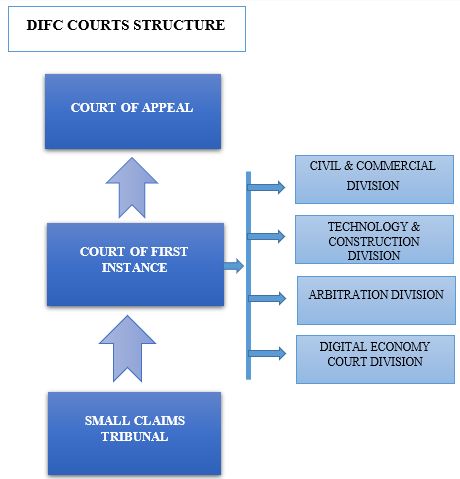This article focuses on answering the question; what are the DIFC Courts?
It will provide a basic understanding of the DIFC Courts in the following areas:
- The Jurisdiction of the DIFC Courts
- Functions of the DIFC Courts
- The DIFC Courts Structure
- Introduction to each Court
- Enforcing the DIFC Court judgment
THE JURISDICTION OF DIFC COURTS
The Dubai Law No. 12 of 2004 (as amended) and the DIFC Law No. 10 of 2004 established the DIFC special courts.
Only civil and business issues are covered by the jurisdiction of the DIFC Courts.
The DIFC Courts exclusively heard cases about DIFC issues up until 2011.
But as it became so prominent, its jurisdiction was expanded. Now parties may opt for the DIFC Laws as the governing law and the DIFC Courts as the jurisdiction in their contracts if they intend to do so.
Accordingly, the court may hear any civil or commercial action in which the two parties choose the DIFC Court's jurisdiction, either in the initial agreement or post-dispute.
FUNCTIONS OF THE DIFC COURTS
These courts have the authority to decide how to resolve commercial and civil disputes within their purview by applying one or more of the following remedies:
- Damages
- Compensations
- Restitution
- Disgorgement
The DIFC COURTS STRUCTURE

COURT OF APPEAL
This Court shall be comprised of at least three (3) Judges
- with the Chief Justice
- or most senior Judge, presiding.
The Court of Appeal has exclusive jurisdiction over:
- Appeals filed against Judgments and Awards made by the Court of First Instance;
- Interpretation of any article of the DIFC's laws based upon the request of any of the DIFC's bodies or the request of any of the DIFC's establishments, provided that the establishment obtains leave of the Chief Justice in this regard. Such interpretation shall have the power of law.
The Court of Appeal lays down the final order or judgment of the Courts, and no appeal shall be permitted from a decision of the Court of Appeal.
COURT OF FIRST INSTANCE
The Court of First Instance (CFI) has exclusive jurisdiction over any civil or commercial case when it relates to the DIFC, in the following context:
- Civil or commercial cases and disputes arising from or related to a contract that has been fulfilled, or a transaction that has been carried out, in whole, or in part, in the DIFC, or an incident that has occurred in the DIFC.
- Objections filed against a decision made by the DIFC's bodies, which are subject to objection by the DIFC's laws and regulations.
- Any application over which the Courts have jurisdiction under the DIFC's laws and regulations.
- The Court of First Instance can hear cases when the contract in question specifies DIFC Courts' jurisdiction (pre-dispute jurisdiction) or when both parties elect to use DIFC Courts to resolve a dispute which has already arisen (post-dispute jurisdiction).
One Judge hears proceedings in the CFI.
Divisions of the CFI
Civil & Commercial Division
- The resolution of complex disputes arising out of civil and commercial matters
- The types of disputes that can be resolved through this
Division are those relating to, but not limited to,
- employment,
- breach of contract,
- property and tenancy,
- banking & finance, which require specific expertise across the broad and complex expanse of disputes of this nature.
- Judge in Charge of the Civil & Commercial Division: Justice Sir Jeremy Cooke
Technology & Construction Division
- Only hears technically complex cases.
Arbitration Division
- Another important service rendered by the DIFC Courts is Arbitration Division, particularly for entities in the MENA region.
- Adopting common law principles in their proceedings, these courts employ judges specialised in international arbitration to deal with:
-
- Appointment of independent arbitrators
- Interpretation of arbitrary agreements
- Implementation of interim measures for the duration of arbitrary proceedings
- Enforcement of the decision once the process concludes
Digital Economy Court Division
- Overseeing sophisticated national and transnational disputes related to current and emerging technologies across areas ranging from big data, blockchain, AI, fintech, and cloud services, to disputes also involving unmanned aerial vehicles (UAVs), 3D printing, and robotics.
SMALL CLAIMS TRIBUNAL
- The Small Claims Tribunal (SCT) can hear claims within the jurisdiction of the DIFC in three situations.
-
- Where the amount or value of the claim does not exceed AED 500,000.
- When the claim relates to the employment or former employment of a party and the amount or value of the claim exceeds AED 500,000, all parties to the claim elect in writing that it be heard by the SCT.
- If in the context of claims which are not employment-related, the amount or value of the claim does not exceed AED 1 million, and all parties elect in writing that it be heard by the SCT as agreed in the initial agreement or subsequent to the dispute.
Enforcement OF DIFC COURT JUDGEMENTS
Judgments of the DIFC Courts can be enforced in different jurisdictions per the Laws and Conventions.
- In the Emirate of Dubai: as per the Federal Civil Procedure Law, provided that the procedure under the DIFC Law (Dubai Law No.12 of 2004 as amended) is followed
- In other Emirates:
-
- either through a Dubai execution judge or
- directly by the local "competent entity" within the UAE (Article 7(2) of Law No. 16 of 2011)
- GCC: Under GCC Convention (1996)
- Throughout the Arab Region: Under the Riyadh Convention (1983)
- In France: by virtue of the Paris Convention (1992), and
- In many other countries (including China and India):
- According to the domestic laws governing the recognition and enforcement of foreign judgments.
Source: The DIFC Courts Official Website
The content of this article is intended to provide a general guide to the subject matter. Specialist advice should be sought about your specific circumstances.
